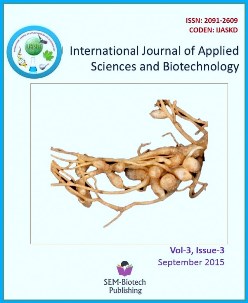A Metagenomics Analysis on B-Carotene Synthesis in Neurospora Crassa
DOI:
https://doi.org/10.3126/ijasbt.v3i3.13306Keywords:
Beta-Carotene, Phytoene synthase (psy), Carotenoids, Neurospora crassa, Oryza sativa Indica, Cyanobacteria.Abstract
We have studied insilico on evolutionary uniqueness of phytoene synthase, which is one of the regulatory enzymes of ?-carotene synthesis in Neurospora crassa. This study reveals multiple sequence alignments showed high sequences with similarity within a species of bacteria, fungi and higher plants. This results designate interestingly between species of bacteria-fungi, fungi-plant, and among the species of bacteria-fungi-plant, showed tremendously less sequence with similarity, except bacteria-plant (high sequence with similarity) respectively. In Phylogenetics tree analysis showed within species of bacteria, fungi and plant 91%, 92% and 99% homology. Whereas in between species of bacteria-fungi, bacteria-plant, fungi-plant, and among the species bacteria-fungi-plant showed 99%, 96%, 100%, and 91%-99% homology respectively. N. crassa phytoene synthase enzyme encode (Isoprenoid Biosynthesis enzymes, Class 1) protein size 610aa, Cyanobacteria phytoene encode (Isoprenoid Biosynthesis enzymes, Class 1) protein size 310aa, and Oryza sativa Indica phytoene synthase 1 (chloroplast), (Isoprenoid Biosynthesis enzymes, Class 1) encode protein size 421aa (e- value 0.0, 0.0 and 0.0; identity 100%, 100% and 100%; Max.score:1238, 644 and 870) respectively. We studied insilico on basis of an evolutionary Endosymbiotic theory; a bacterium is the ancestors to eukaryotes.
Int J Appl Sci Biotechnol, Vol 3(3): 490-503




